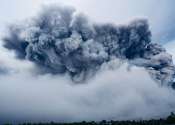How volcanoes explode in the deep sea
Most volcanic eruptions take place unseen at the bottom of the world's oceans. In recent years, oceanography has shown that this submarine volcanism not only deposits lava but also ejects large amounts of volcanic ash.









